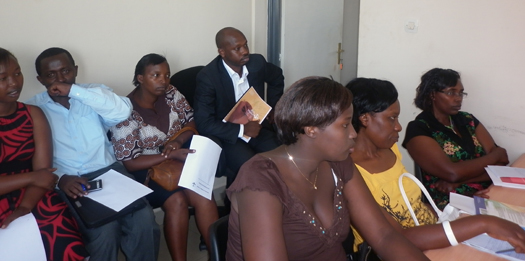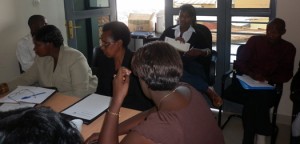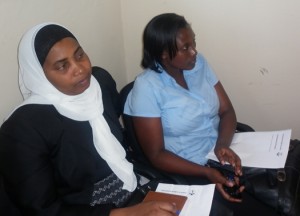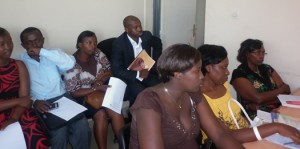
Building on the momentum of its legal defense training workshops and other awareness-raising activities, IBJ Rwanda has established a core group of 23 dedicated lawyers who are reunited in the Criminal Defense Task Force. They meet regularly to identify and discuss key challenges they face in their daily work and suggest solutions for improvement. On the 30th of September, the Task Force met at the DRC in Kigali to discuss the difficulties in providing legal aid to indigents in Rwandan prisons.
One of the difficulties that came up in the discussions was the need to travel long distances repeatedly, especially because cases can take up to ten court hearings before being resolved. Also, the lack of access to legal resources in print and on the internet has been highlighted as a difficulty by some of the Task Force members. IBJ is striving to fill this gap by providing visitors to the DRC with the opportunity to use a new desktop computer to conduct online legal resource and access IBJ’s eLearning platform. A collection of human rights and criminal law books kindly donated by Book Aid International is on its way.
Members of the Task Force were interested in improving their legal English skills at the DRC and on IBJ’s online Legal Training Resource Center. This is important, particularly in the context of the growing regional integration which requires use of legal English and familiarity with the adversarial system in force in the vast majority of the East African countries. Lawyers highlighted defender capacity building and regular mentoring sessions as a core strategy to help ensure greater quality of legal counsel throughout the proceedings. In this regard, they will find the new glossary developed by IBJ, translating legal jargon from French to English, very useful.
The discussions also emphasized the need for continuous education and awareness-raising among the public to help them demand their rights, in particular their right to a lawyer in case of arrest. Members of the Task Force committed to systematically inform their clients and detainees of their basic legal rights while conducting prison visits. Intensified education of prison wardens and officials was also identified as a strategy to ensure increased access to legal aid. By addressing these issues, the Task Force members are closing the gap in legal aid provision in criminal cases, as the Government-sponsored legal aid centers called Maisons d’ Accès a la Justice primarily focus on civil cases.
Following up on the need to create a tighter connection between the Task Force and the DRC, two particularly dedicated, outspoken and determined Task Force members – Mary Katushabe and Olivier Gatabazi – were elected Task Force representatives by the rest of the lawyers over the course of the meeting. Both display an unwavering commitment to criminal legal aid: of the six cases that Olivier is handling on behalf of IBJ none of them is financially supported; and as for Mary, she is representing eighteen indigents on behalf of IBJ and is fully supported for only seven of them. The two representatives will act as liaison between the Task Force members and the DRC, thus ensuring the constant flow of communication between the lawyers and IBJ. The Task Force Justice Café discussion that took place on the 30th of September proved to be valuable in identifying key challenges and possible solutions and maintaining the momentum among the volunteer lawyers who have already assisted 135 detainees, with on-going mentoring from IBJ Rwanda Fellow. This will ultimately ensure that the criminally accused get the most professional and best defense possible and will bring Rwanda one step closer to IBJ’s mission of ensuring that every man, woman and child accused of a crime has effective access to legal counsel.
The next Task Force meeting will take place on November 26th. In the meantime, the volunteer lawyers will participate in group or one-on-one mentoring sessions at the DRC where newly-minted lawyers will be able to learn “on the job”. We are excited that the Task Force members are recognized as contributing to and promoting positive change in the criminal justice system. They are motivated to continue on this course and even find possible funding sources for legal aid pilot projects.
-

Above: Rwandan Criminal Defense Task Force meet to discuss ways forward for the legal aid system (Photo by John Bosco Bugingo)
-

Above: Members of the Criminal Defense Task Force listening to colleagues during the Justice Cafe (Photo by Hadijah Batamuliza)
-

Above: Rwandan Lawyers meet at the DRC to discuss challenges and solutions they face in the provision of legal aid (Photo by Hadijah Batamuliza)